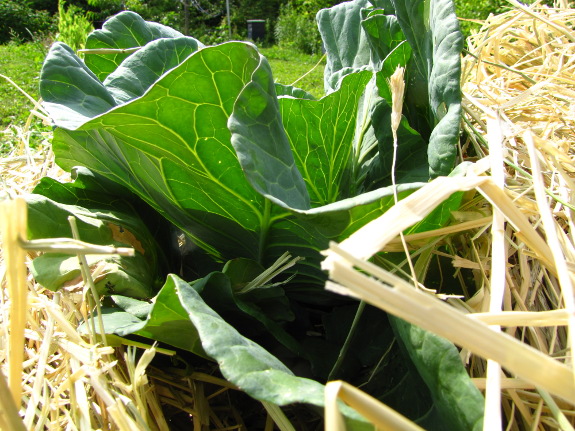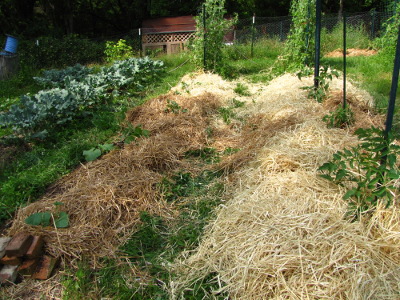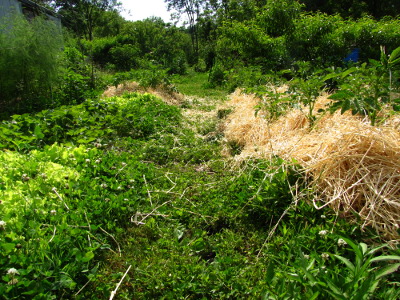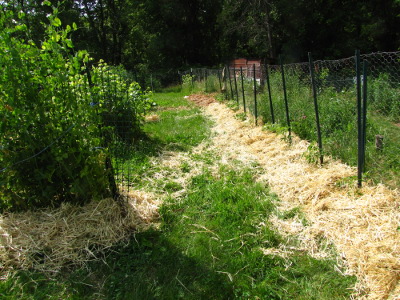
Going mulch crazy


"Are you going to be mad
if I'm profligate with the
straw?" I asked Mark
tentatively on Thursday afternoon. He looked at me as if I was a
bit slow --- after all, he's the one who pushes me to buy mulch when I
say it's too expensive --- and replied: "No, if anything, you'll get
bonus kisses."
I didn't ask about the manure and cardboard because I didn't want to
give him a chance to say "No, those require a lot more work!"
Instead, once he
and the big white truck had headed into the city Friday morning, I went to
town (figuratively.) Why not hill up  potatoes with composted
manure then mulch them with straw? Those back garden beds need
some serious soil remediation anyway because the topsoil is so thin
there. Big weeds threatening to overcome some tomato plants that
haven't been weeded in two months? No problem --- lay
down a quick kill mulch of damp cardboard and then top it all off with
straw. When
quitting time came at 4 pm, I had to tear myself away from my biomass
piles.
potatoes with composted
manure then mulch them with straw? Those back garden beds need
some serious soil remediation anyway because the topsoil is so thin
there. Big weeds threatening to overcome some tomato plants that
haven't been weeded in two months? No problem --- lay
down a quick kill mulch of damp cardboard and then top it all off with
straw. When
quitting time came at 4 pm, I had to tear myself away from my biomass
piles.
When we had less cash on
hand, I frowned upon storebought mulch. But now that we can
afford it, I figure this is the kind of time-saver I can get behind
buying (at least until I come  up with a homegrown
alternative.) Not only does mulch cut down on weeding, the
biomass also breaks down into organic matter that's like money in the
bank --- mulched beds are full
of worms, and every
year the soil gets fluffier and darker. Since I can't foresee any
reason we'd ever move off the farm, building our soil is a long term
investment in our future, making gardening easier every year while the
food grown there becomes tastier and better for us. As usual,
Mark was right. (Don't let it go to your head, honey. And I
plan to collect on that bonus.)
up with a homegrown
alternative.) Not only does mulch cut down on weeding, the
biomass also breaks down into organic matter that's like money in the
bank --- mulched beds are full
of worms, and every
year the soil gets fluffier and darker. Since I can't foresee any
reason we'd ever move off the farm, building our soil is a long term
investment in our future, making gardening easier every year while the
food grown there becomes tastier and better for us. As usual,
Mark was right. (Don't let it go to your head, honey. And I
plan to collect on that bonus.)
Want more in-depth information? Browse through our books.
Or explore more posts by date or by subject.
About us: Anna Hess and Mark Hamilton spent over a decade living self-sufficiently in the mountains of Virginia before moving north to start over from scratch in the foothills of Ohio. They've experimented with permaculture, no-till gardening, trailersteading, home-based microbusinesses and much more, writing about their adventures in both blogs and books.
Want to be notified when new comments are posted on this page? Click on the RSS button after you add a comment to subscribe to the comment feed, or simply check the box beside "email replies to me" while writing your comment.

Anna, sis,
Is it possible to mulch too much? I wonder if there ever is a point when the compost put in the soil becomes a burden to the dirt or possibly the water downstream? I don't think you do this much on your little farm, but if the practice of mulching that you do was turned large scale would it be a problem at all?
Just a philosophical question maybe...
M
I think it would definitely be possible to add too much mulch, especially if the mulch was heavy (like the new load of leaf litter mulch we just picked up). Something like straw is so airy that it's hard to mess up, but heavier mulches put on more than two or three inches thick could potentially cut down air flow into the soil, which would turn the environment anaerobic and kill all of the beneficial microorganisms.
Compost is a slightly different matter. Mulch is low in available nitrogen, so you're not going to cause runoff, but compost could if it's very high in nitrogen (like the chicken manure compost we bought last year.) The grassy aisle between our beds capture any potential runoff, but who wants to waste nitrogen? Adding a mulch layer on top tends to grab that nitrogen and prevent runoff, but you could still have a problem within the soil itself from the excess nitrogen, since it would promote bacterial growth and harm fungi (which could be a good thing for certain crops that like a bacteria dominant soil, but bad for other crops who prefer fungi.) Most compost, though, has relatively low levels of available nitrogen and acts more like a time-delay fertilizer, so you don't tend to have problems there.
The real environmental problems with using mulch and compost is in their production and hauling to the farm. Straw is a waste product from growing grain, but people barely grow grain around here, so I have to figure that they trucked my straw from the Midwest --- wasteful. The leaf compost is also a waste product, and even though they use machinery to mix and shred it, I figure turning it into mulch is a net gain for the environment since the yard waste would otherwise go into a landfill. On the other hand, we had to haul the leaf compost further in our truck, which is the big environmental downfall there. Our horse manure compost is pretty much a win for the environment --- waste product only hauled about three miles.
(Why are you linking to the North American Corporation? I never knew you were into eliminating inefficiencies in big businesses...)
Your guess that you emailed to me is the right one. I accidentally logged in that way when I typed "na."
I appreciate what you said. I am very intrigued by what you said about the straw going so far and being such a problem. Amen to that!
Keep on mulching then!
I'm with you on both points. I use a lot of mulch when I can afford it but I want to try growing some wheat and oats to see if I can use it to mulch with.
The other commenter is also right that you can use too much mulch as certain types will adjust your soil PH. For instance if you use a lot of shredded oak leaf mulch it will mess with your soil PH. Certainly you can adjust for that, but you just need to be conscientious of the effects of whatever you're adding.
This year I have a lot of new garden areas that I'm planting and I'm actually going to use plastic mulch like they did back in the 70s and 80s. I'm doing it primarily because I am running behind on planting and don't want to round-up the grass and I need to kill off the grass. So I dig some rows for walking in, pile them up in the bed, mix in some peat moss and sand, phosphate and calcium(found out I needed this from my soil test). Then I water it a bit to get the phosphate and calcium into the soil and then wrap it in 6' wide 3 mil plastic. Kills off the grass and gives my plants a fair chance. Next year I'll mulch with straw or something else that will help the soil.
http://deathtozombies.com
Good point about pH. Of course, most compostable organic matter will make your soil more acidic, so it's good to keep an eye on that in general, and it's pretty easy to fix with lime or wood ashes.
If you use the wrong kind of mulch, you can cause all kinds of harm, but it's not about the amount so much as the type. For example, I try to keep woody mulches around the perennials instead of the garden since they promote high fungal to bacterial ratios, and use more nitrogenous mulches in the vegetable garden. I've mulched the garden with straight leaves from the woods, and that was okay, but I could tell the plants didn't prefer it.
I've always steered clear of plastic mulch. Mostly, I hate the idea of having to pull pieces of partially biodegraded plastic out of the soil and figure if I'm paying for mulch, I want it to build my soil. But I also worry that a plastic mulch would cut off airflow and mess with soil microorganisms. When I want to build a garden bed on top of lawn, I lay down a thick layer of damp cardboard (one to two sheets of corrugated), top it off with good compost, and then mulch on top of that. This method has worked very well for planting into immediately, and you end up with very rich soil in the long run.